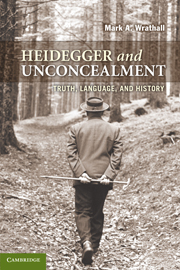Book contents
- Frontmatter
- Contents
- Acknowledgments
- Credits
- Introduction
- Part I Truth and Disclosure
- Part II Language
- Part III Historical Worlds
- 8 Philosophers, Thinkers, and Heidegger’s Place in the History of Being
- 9 Between the Earth and the Sky: Heidegger on Life After the Death of God
- 10 Nietzsche and the Metaphysics of Truth
- Works by Heidegger
- Index
10 - Nietzsche and the Metaphysics of Truth
Published online by Cambridge University Press: 05 June 2012
- Frontmatter
- Contents
- Acknowledgments
- Credits
- Introduction
- Part I Truth and Disclosure
- Part II Language
- Part III Historical Worlds
- 8 Philosophers, Thinkers, and Heidegger’s Place in the History of Being
- 9 Between the Earth and the Sky: Heidegger on Life After the Death of God
- 10 Nietzsche and the Metaphysics of Truth
- Works by Heidegger
- Index
Summary
For Heidegger, the history of Western philosophy is “from Plato until Nietzsche the history of metaphysics” (GA 48: 296). More precisely, the history that connects Plato to Nietzsche is the “unfolding of the essence of metaphysics as the history of the truth of entities as such as a whole” (GA 66: 40). One might think that Nietzsche would be an obvious ally for Heidegger in his project of criticizing the metaphysical tradition, given Nietzsche’s own attacks on metaphysical and philosophical understandings of truth. And yet, Heidegger insists that Nietzsche too remains entangled in a metaphysical account of truth. Understanding why this is so illuminates both Heidegger’s understanding of metaphysics and his views on truth.
Now, it would be ludicrous to try to read Nietzsche as adhering to a metaphysical account of truth in any traditional way. Nietzsche himself described metaphysical views of truth as “the history of an error,” the history of “how the ‘true world’ finally became a fable” (Twilight of the Idols). The “true world,” he wrote, has become “an idea that is of no further use.” “The true world is gone.” Moreover, he famously declared our holding things to be true to be an error, “the kind of error without which a certain kind of living beings could not live” (WP: 493). For Nietzsche, it is an illusion that there are true things, and thus our reverence for the truth is error because it is directed at an illusion: “we have created the world that possesses values! Knowing this, we know, too, that reverence for truth is already the consequence of an illusion–and that one should value more than truth the force that forms, simplifies, shapes, invents” (WP: 602). The idea of a metaphysical truth is the result of our practical need for stability:
that something must be held to be true is necessary; not that something is true. “The true and the apparent world” – I have traced this contrast back to relations of value. We have projected our conditions of preservation as predicates of being in general. That we must be stable in our beliefs in order to thrive, from this it follows that we have made the “true” world something that is not changeable and becoming, but rather something that is being.
(WP: 507)Thus, given his obvious pains to distance himself from metaphysical notions of a true world or a truth in itself, it is prima facie implausible to charge Nietzsche with a continued adherence to traditional accounts of truth. To understand Heidegger’s interpretation and critique of Nietzsche, then, we need to specify what exactly Heidegger considers to be objectionably metaphysical about traditional approaches to truth, and why it is that he thinks Nietzsche’s rejection of traditional approaches did not succeed in extricating him from metaphysical entanglements. Toward that end, let’s clarify what Heidegger means when he talks about “the truth of entities as such and as a whole.”
- Type
- Chapter
- Information
- Heidegger and UnconcealmentTruth, Language, and History, pp. 212 - 242Publisher: Cambridge University PressPrint publication year: 2010



